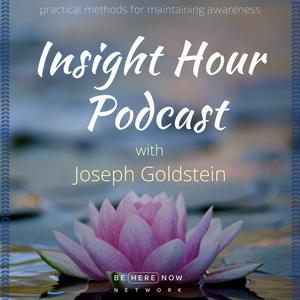
Insight Hour with Joseph Goldstein
Be Here Now Network
Joseph Goldstein has been a leading light for the practice of Insight and Loving Kindness meditation since his days in India and Burma where he studied with eminent masters of the tradition. In his podcast, The Insight Hour, Joseph delivers these essential mindfulness teachings in a practical and down to earth way that illuminates the practice through his own personal experience and wonderful story telling.
- 55 minutes 7 secondsEp. 230 – Applying Our Effort Skillfully, Satipatthana Sutta Series Pt. 29
Considering how right effort drives our achievements and potential for happiness, Joseph Goldstein teaches us more about the dhamma.
The Satipatthana Sutta is one of the most celebrated and widely studied discourses in the Pāli Canon of Theravada Buddhism. This episode is the twenty-ninth part of an in-depth 48-part weekly lecture series from Joseph Goldstein that delves into every aspect of the Satipatthana Sutta. If you are just now jumping into the Satipatthana Sutta series, listen to Insight Hour Ep. 203 to follow along and get the full experience!
In this episode, Joseph lectures listeners on:
- Energy as the root of all achievement
- How energy can be associated with both unwholesome and wholesome states
- Putting our energy to wise use
- Taking the opportunity to challenge ourselves and extend our limits
- Getting caught in efforting and in the result of an action
- Investigating our own minds
- Reflection on death and using our time wisely
- The possibilities of every happiness
Grab a copy of the book Joseph references throughout this series, Satipaṭṭhāna: The Direct Path to Realization, HERE
This talk was originally published on Dharmaseed
“Right effort is not an ambitious striving. Skillful effort is the effort to be present for what is already here.” – Joseph Goldstein
See Privacy Policy at https://art19.com/privacy and California Privacy Notice at https://art19.com/privacy#do-not-sell-my-info.
17 January 2025, 8:23 pm - 59 minutes 14 secondsEp. 231 – Inner Investigation, Satipatthana Sutta Series Pt. 28
Joseph Goldstein shares how unremitting mindfulness and continuous investigation of our mental states will lead us to liberation.
The Satipatthana Sutta is one of the most celebrated and widely studied discourses in the Pāli Canon of Theravada Buddhism. This episode is the twenty-eighth part of an in-depth 48-part weekly lecture series from Joseph Goldstein that delves into every aspect of the Satipatthana Sutta. If you are just now jumping into the Satipatthana Sutta series, listen to Insight Hour Ep. 203 to follow along and get the full experience!
This time on Insight Hour, Joseph pursues these topics:
- Establishing unremitting mindfulness
- Investigating and examining our mental states
- How truth discerning wisdom liberates the mind
- The three universal characteristics of experience
- Cultivating wisdom through investigation of the dhamma
- Looking at the motivation behind our actions of body, speech, or mind
- The two kinds of happiness according to the Buddha
- Investigating ourselves when we are in a storm of emotions
- How clear recognition can be enough to help us let go
- Discerning the difference between the knowing and the object
- How a single moment of truth-discerning wisdom can change us
Grab a copy of the book Joseph references throughout this series, Satipaṭṭhāna: The Direct Path to Realization, HERE
This talk was originally published on Dharmaseed
“By understanding that it is wisdom that illuminates what is true, and that we cultivate wisdom through investigation of the dhamma, we can begin to appreciate the very broad range of skillful means and methods that are in different Buddhist traditions for accomplishing this inquiry.“– Joseph Goldstein
See Privacy Policy at https://art19.com/privacy and California Privacy Notice at https://art19.com/privacy#do-not-sell-my-info.
9 January 2025, 3:34 pm - 57 minutes 16 secondsEp. 230 – The Factors of Awakening, Satipatthana Sutta Series Pt. 27
Outlining the crucial importance of the Buddha’s seven awakening factors, Joseph explains the promise of our practice.
The Satipatthana Sutta is one of the most celebrated and widely studied discourses in the Pāli Canon of Theravada Buddhism. This episode is the twenty-seventh part of an in-depth 48-part weekly lecture series from Joseph Goldstein that delves into every aspect of the Satipatthana Sutta. If you are just now jumping into the Satipatthana Sutta series, listen to Insight Hour Ep. 203 to follow along and get the full experience!
This week on Insight Hour, Joseph provides wisdom on:
- The seven treasures, or factors of awakening, of the Buddha
- How the factors of awakening act as anti-hindrances
- Mindfulness, wisdom, energy, rapture, calm, concentration, and equanimity
- The promise and purpose of our practice
- Priming the pump of the enlightened mind
- A deeper dive into the first factor of awakening: mindfulness
- Calling to mind what is skillful and what is not
- Bare attention and clear comprehension
- Knowing the purpose behind an action, and if it is beneficial
Grab a copy of the book Joseph references throughout this series, Satipaṭṭhāna: The Direct Path to Realization, HERE
This talk was originally published on Dharmaseed
“The Buddha called these factors anti-hindrances because they counteract those forces in the mind that keep us in delusion. It’s sort of like anti-freeze; anti-hindrances, they keep our minds from getting congealed or frozen.“– Joseph Goldstein
See Privacy Policy at https://art19.com/privacy and California Privacy Notice at https://art19.com/privacy#do-not-sell-my-info.
3 January 2025, 8:24 pm - 54 minutes 31 secondsEp. 229 – Freedom From Our Mental Shackles, Satipatthana Sutta Series Pt. 26
Teaching listeners to become masters over their perceptions, Joseph Goldstein describes the four great hallucinations of the mind.
The Satipatthana Sutta is one of the most celebrated and widely studied discourses in the Pāli Canon of Theravada Buddhism. This episode is the twenty-sixth part of an in-depth 48-part weekly lecture series from Joseph Goldstein that delves into every aspect of the Satipatthana Sutta. If you are just now jumping into the Satipatthana Sutta series, listen to Insight Hour Ep. 203 to follow along and get the full experience!
In this episode, Joseph helps listeners understand:
- The latent tendencies of the mind which condition our perceptions
- How basic sense impressions can be mistaken
- The four great hallucinations of perceptions as outlined by the Buddha
- Taking what is impermanent to be permanent
- The root of suffering
- Taking what is not self to be self
- Having mastery over our perceptions
- Ways of perceiving that lead to liberation
- How moods deceive the mind
This talk was originally published on Dharmaseed
“A good feedback for us for when we’re lost in this hallucination of perception, taking what’s impermanent to be permanent, is whenever we notice clinging or attachment. When there’s clinging or attachment what that means is that in those moments we are not seeing clearly and we are not experiencing deeply the truth of change, the truth of impermanence. We are diluted into thinking that a particular experience in some way is worth holding onto.“– Joseph Goldstein
See Privacy Policy at https://art19.com/privacy and California Privacy Notice at https://art19.com/privacy#do-not-sell-my-info.
27 December 2024, 7:30 pm - 1 hourEp. 228 – Suffering And The Senses, Satipatthana Sutta Series Pt. 25
Cutting the chain of dependent origination, Joseph Goldstein teaches wise attention and freedom from defilement as the antidote to suffering.
The Satipatthana Sutta is one of the most celebrated and widely studied discourses in the Pāli Canon of Theravada Buddhism. This episode is the twenty-fifth part of an in-depth 48-part weekly lecture series from Joseph Goldstein that delves into every aspect of the Satipatthana Sutta. If you are just now jumping into the Satipatthana Sutta series, listen to Insight Hour Ep. 203 to follow along and get the full experience!
This episode is brought to you by BetterHelp. Give online therapy a try at betterhelp.com/insighthour and get on your way to being your best self.
This time on Insight Hour, Joseph continues exploring:
- The timelessness of the dhamma
- How fetters of the mind arise and how to remove them
- Preventing the future arising of mental fetters
- The coming together of sense base, object, and consciousness
- Desire as the automatic response to pleasant feelings
- Aversion as our conditioned response to aversion
- Neutrality and how it can lead to delusion
- The necessity of wise attention to avoid suffering
- Cutting the chain of dependent origination
- Being mindful of what is actually arising moment to moment
- Reinforcing our understanding of the impermanence of desire
- Taking responsibility for our own minds
Grab a copy of the book Joseph references throughout this series, Satipaṭṭhāna: The Direct Path to Realization, HERE
This talk was originally published on Dharmaseed
“Coming to the end of suffering means that we learn how to work with and understand and free ourselves from the force of the fetters in the mind. What’s amazing about this teaching is that it’s ultimately, completely empowering because it’s all up to us. Our suffering is not due to other people. We can take responsibility for our own minds.”– Joseph Goldstein
See Privacy Policy at https://art19.com/privacy and California Privacy Notice at https://art19.com/privacy#do-not-sell-my-info.
19 December 2024, 6:00 pm - 57 minutes 10 secondsEp. 227 – The Six Sense Bases, Satipatthana Sutta Series Pt. 24
Joseph Goldstein explores the six internal and external sense bases of consciousness, explaining its selfless and contingent nature.
The Satipatthana Sutta is one of the most celebrated and widely studied discourses in the Pāli Canon of Theravada Buddhism. This episode is the twenty-fourth part of an in-depth 48-part weekly lecture series from Joseph Goldstein that delves into every aspect of the Satipatthana Sutta. If you are just now jumping into the Satipatthana Sutta series, listen to Insight Hour Ep. 203 to follow along and get the full experience!
This week, Joseph offers wisdom on:
- Mindfulness of the patterns of experience
- Internal and external sense spheres
- The mind as a sixth sense
- The way we attach the self to all we experience
- Seeing objects as being conditioned and selfless
- Our sense organs and paying attention to how we experience senses
- The contingent nature of consciousness
- Freeing the mind by becoming disenchanted
- Recognizing defilements when they arise, and letting them go
- How we often push the river of experience rather than allowing it to flow
- Maintaining openness of the mind without preferences
“What’s difficult is to see all of these sense objects and the sense bases, to see and understand them as being conditioned, selfless, not I, not mine, not belonging to anyone. Not only seeing the sense object and sense base as selfless, but seeing the knowing of them as selfless.”– Joseph Goldstein
Grab a copy of the book Joseph references throughout this series, Satipaṭṭhāna: The Direct Path to Realization, HERE
This talk was originally published on Dharmaseed
See Privacy Policy at https://art19.com/privacy and California Privacy Notice at https://art19.com/privacy#do-not-sell-my-info.
11 December 2024, 10:25 pm - 1 hour 4 minutesEp. 226 – Non-Self, Satipatthana Sutta Series Pt. 23
Joseph Goldstein explains the value in recognizing the body and self as impermanent, man-made concepts rather than something fixed and solid.
The Satipatthana Sutta is one of the most celebrated and widely studied discourses in the Pāli Canon of Theravada Buddhism. This episode is the twenty-third part of an in-depth 48-part weekly lecture series from Joseph Goldstein that delves into every aspect of the Satipatthana Sutta. If you are just now jumping into the Satipatthana Sutta series, listen to Insight Hour Ep. 203 to follow along and get the full experience!
This episode is brought to you by BetterHelp. Give online therapy a try at betterhelp.com/insighthour and get on your way to being your best self.This week, Joseph explains to listeners:
- Noticing the changing nature of all phenomena
- The flow of changing sensations and thoughts
- The superficial perception we have of the body
- How attachment to the body contributes to a fear of death
- What creates the felt sense of self
- Noticing the difference between being lost in a thought and noticing thinking
- Seeing the empty selfless nature of thoughts
- Practicing seeing impermanence through mindfulness of the five aggregates
- Regarding our body, feelings, perception, and consciousness as non-self
This talk was originally published on Dharmaseed
Grab a copy of the book Joseph references throughout this series, Satipaṭṭhāna: The Direct Path to Realization, HERE
“It is so freeing to realize that the only power that thoughts have is the power that we give them. The thought itself is little more than nothing. It is just this little blip in the mind, arising and passing away. But, when they’re unnoticed and we’re identified with them, taking them to be self, we’re giving them an enormous power in our lives.” – Joseph Goldstein
See Privacy Policy at https://art19.com/privacy and California Privacy Notice at https://art19.com/privacy#do-not-sell-my-info.
5 December 2024, 7:53 pm - 1 hour 3 minutesEp. 225 – Understanding Formation and Consciousness, Satipatthana Sutta Series Pt. 22
Concluding a segment on the five aggregates, Joseph Goldstein explains how mindfulness of mental formations refines our consciousness.
The Satipatthana Sutta is one of the most celebrated and widely studied discourses in the Pāli Canon of Theravada Buddhism. This episode is the twenty-second part of an in-depth 48-part weekly lecture series from Joseph Goldstein that delves into every aspect of the Satipatthana Sutta. If you are just now jumping into the Satipatthana Sutta series, listen to Insight Hour Ep. 203 to follow along and get the full experience!
This episode is brought to you by BetterHelp. Give online therapy a try at betterhelp.com/insighthour and get on your way to being your best self.
In this episode, Joseph thoughtfully outlines:
- The mental factor of intention / volition as the chief of the mind
- How the seeds we plant have tremendous potential
- Considering the motivations of our intentions
- Sorting out what is wholesome versus unwholesome
- The three roots of all unwholesome actions: greed, hatred, and delusion
- The three wholesome roots: generosity, loving-kindness, and wisdom
- Pausing before we act so we can make wiser choices in our lives
- How mindfulness attracts all of the fruits of wholesome action
- The unchanging nature of bare knowing
- The four causes of seeing consciousness
- Consciousness as a conditioned phenomena
- Focusing on what is arising through a passive voice and non-subject
- Cultivating the open sky of the mind
This talk was originally published on Dharmaseed
Grab a copy of the book Joseph references throughout this series, Satipaṭṭhāna: The Direct Path to Realization, HERE
“The Buddha is saying that consciousness itself is a conditioned phenomena. It’s impersonal, arising out of causes, arising out of conditions moment to moment. Here we see that consciousness is not something that’s permanent. It’s not something that’s always present waiting for an object to appear, to be known. But rather consciousness itself is a process continually arising and passing away moment after moment.” – Joseph Goldstein
See Privacy Policy at https://art19.com/privacy and California Privacy Notice at https://art19.com/privacy#do-not-sell-my-info.
27 November 2024, 9:31 pm - 58 minutes 36 secondsEp. 224 – Buddhist Teachings on Perception & Formation, Satipatthana Sutta Series Pt. 21
Continuing his discussion of the five aggregates, Joseph Goldstein dives deeper into perception and how we can get lost in mental formations.
The Satipatthana Sutta is one of the most celebrated and widely studied discourses in the Pāli Canon of Theravada Buddhism. This episode is the twenty-first part of an in-depth 48-part weekly lecture series from Joseph Goldstein that delves into every aspect of the Satipatthana Sutta. If you are just now jumping into the Satipatthana Sutta series, listen to Insight Hour Ep. 203 to follow along and get the full experience!
This episode is brought to you by BetterHelp. Give online therapy a try at betterhelp.com/insighthour and get on your way to being your best self.
In another exploration of the Satipatthana Sutta, Joseph discusses:
- Balancing perception with mindfulness
- Using the frame of our perception to enter more deeply into experience
- Our tendency to solidify the world through superficial concepts
- The seduction of being lost in the future and past
- Reality and the concept of the present moment
- Created concepts of self-image
- The delineation of mental factors; universal, occasional, and unwholesome
- Considering the understanding of karma
- Having interest in our mental formations and taking time to investigate them
- How mindfulness of mental formations helps us see how impersonal everything is
Grab a copy of the book Joseph references throughout this series, Satipaṭṭhāna: The Direct Path to Realization, HERE
This talk was originally published on Dharmaseed
“We also create concepts about things that may seem even more fundamental like age, gender or race. But when we look more deeply, we see that these are concepts too. How old is your breath? It doesn’t make sense. Is the pain in your back male or female? What color is your mind? It’s not to say that the concepts don’t point to some differences of experience, but we often become so identified with and attached to the concept." – Joseph Goldstein
See Privacy Policy at https://art19.com/privacy and California Privacy Notice at https://art19.com/privacy#do-not-sell-my-info.
21 November 2024, 4:57 pm - 59 minutes 7 secondsEp. 223 – Buddhism's Five Aggregates, Satipatthana Sutta Series Pt. 20
In this profound investigation of subjective experience and direct reality, Joseph Goldstein looks at the first three of the five aggregates in Buddhism.
The Satipatthana Sutta is one of the most celebrated and widely studied discourses in the Pāli Canon of Theravada Buddhism. This episode is the twentieth part of an in-depth 48-part weekly lecture series from Joseph Goldstein that delves into every aspect of the Satipatthana Sutta. If you are just now jumping into the Satipatthana Sutta series, listen to Insight Hour Ep. 203 to follow along and get the full experience!
In this episode, Joseph analyzes:
- The five aggregates of clinging and deconstructing subjective experience
- Opening the stainless dharma vision eye
- How the Buddha shows the way to those who are lost
- The direct realities underlying the surface appearance of being
- All of the elements which give rise to the experience of self / the aggregate of Rūpa
- The nature of material elements and the four great essentials
- Our experiences as a flow of changing vibrations
- The second aggregate, Vedanā, aka the feeling qualities of experiences
- Feelings as the conditioning factor of our reactions
- Collapsing into the identification with pleasant vs. unpleasant
- Saññā, the aggregate of perception
- Recognizing, naming, and remembering each arising object
- The function of mental noting and focusing on mindfulness
Grab a copy of the book Joseph references throughout this series, Satipaṭṭhāna: The Direct Path to Realization, HERE
This talk was originally published on Dharmaseed
“The Buddha uses this contemplation of the aggregates to analyze our subjective experience and, through this analysis, to deconstruct the very deeply held construct and belief in self.” – Joseph Goldstein
See Privacy Policy at https://art19.com/privacy and California Privacy Notice at https://art19.com/privacy#do-not-sell-my-info.
14 November 2024, 3:08 pm - 54 minutes 40 secondsEp. 222 – Doubt, Satipatthana Sutta Series Pt. 19
Highlighting the danger of indecision, Joseph Goldstein examines the nature of doubt as taught by the Buddha.
This episode is brought to you by BetterHelp. Give online therapy a try at betterhelp.com/insighthour and get on your way to being your best self.
The Satipatthana Sutta is one of the most celebrated and widely studied discourses in the Pāli Canon of Theravada Buddhism. This episode is the nineteenth part of an in-depth 48-part weekly lecture series from Joseph Goldstein that delves into every aspect of the Satipatthana Sutta. If you are just now jumping into the Satipatthana Sutta series, listen to Insight Hour Ep. 203 to follow along and get the full experience!
This week on Insight Hour, Joseph explains to listeners:
- How elements of mind and body function
- What the Buddha said about working with and overcoming doubt
- Recognizing whether or not doubt is present within ourselves
- The nature and character of the doubting mind
- The danger of being paralyzed by indecision
- Doubt within our meditation practice / Doubting parts of the dhamma
- Contemplating the unattractive elements of the body
- Doubting the value of practice in a world of suffering
- The deep pattern of self-doubt
- How doubt masquerades as wisdom
- Paying attention to what triggers doubt
- Understanding what is wholesome and unwholesome
- Investigation and the wisdom mind as the cure to doubt
Grab a copy of the book Joseph references throughout this series, Satipaṭṭhāna: The Direct Path to Realization, HERE
This talk was originally published on Dharmaseed
“When doubt is strong, and we’re paralyzed by indecision, this mental force doesn’t even allow us the opportunity to take a wrong turn and to learn from our mistakes; rather, we’re always checking ourselves, we’re vacillating, we’re trying to decide.” – Joseph Goldstein
See Privacy Policy at https://art19.com/privacy and California Privacy Notice at https://art19.com/privacy#do-not-sell-my-info.
7 November 2024, 4:45 pm - More Episodes? Get the App
Your feedback is valuable to us. Should you encounter any bugs, glitches, lack of functionality or other problems, please email us on [email protected] or join Moon.FM Telegram Group where you can talk directly to the dev team who are happy to answer any queries.
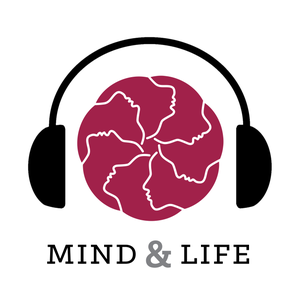 Mind & Life
Mind & Life
 Tara Brach
Tara Brach
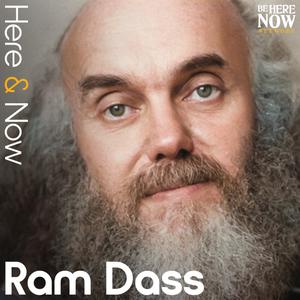 Ram Dass Here And Now
Ram Dass Here And Now
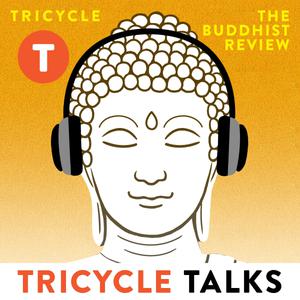 Tricycle Talks
Tricycle Talks
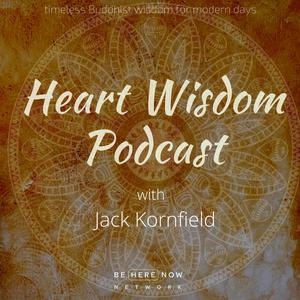 Heart Wisdom with Jack Kornfield
Heart Wisdom with Jack Kornfield
 Metta Hour with Sharon Salzberg
Metta Hour with Sharon Salzberg